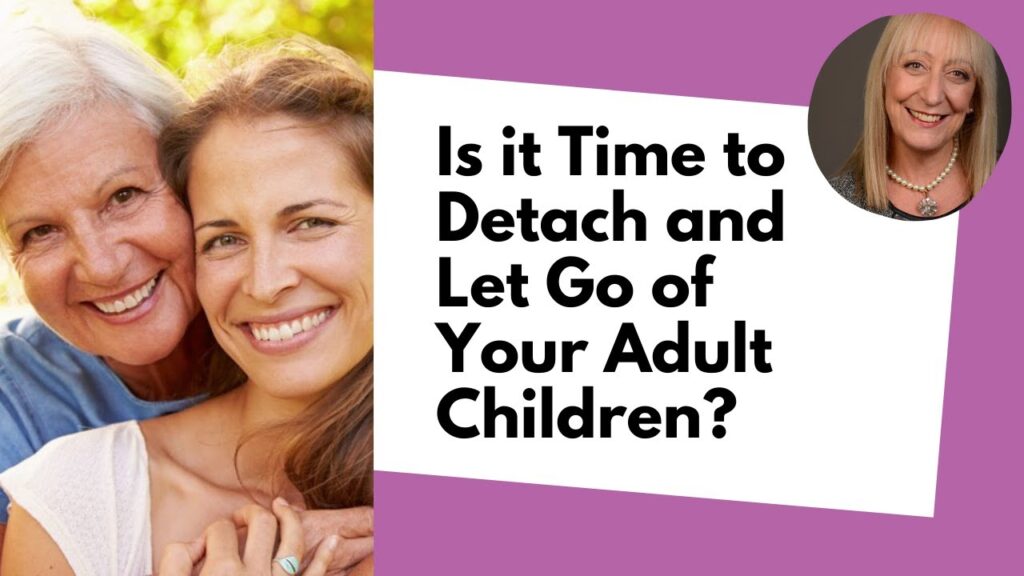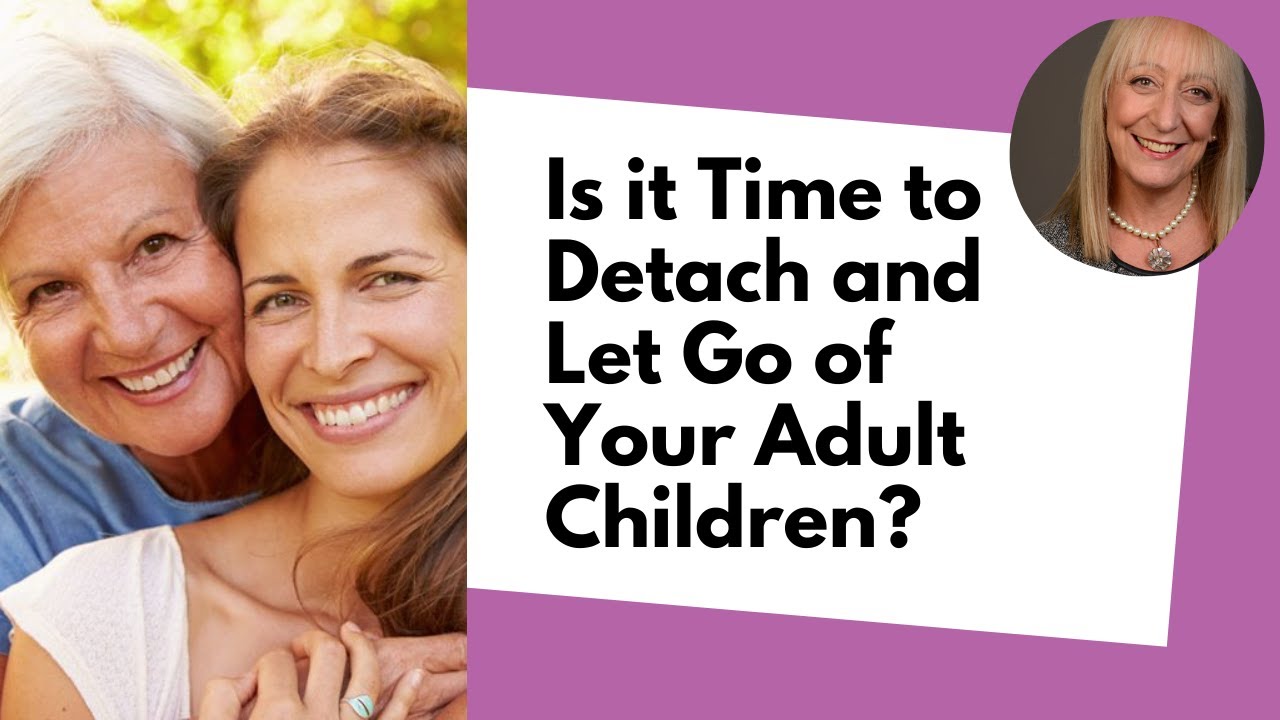
How to Let Go of Adult Children: A Guide for Parents
Parenting is a lifelong journey, but there comes a point when children transition into adulthood, requiring a shift in the parent-child dynamic. Learning how to let go of adult children is a crucial, albeit challenging, step for both parents and their offspring. This article explores the nuances of this process, offering practical advice and insights into fostering healthy independence and maintaining strong relationships with your grown children. Understanding how to let go of adult children involves recognizing their autonomy, respecting their choices, and redefining your role in their lives.
Understanding the Need to Let Go
As children grow, their need for parental guidance evolves. While support and advice remain valuable, adult children need the space to make their own decisions, even if those decisions differ from what their parents might choose. The inability to let go of adult children can lead to resentment, strained relationships, and hinder their ability to develop self-reliance. It’s essential to recognize the signs that your child is ready for greater independence and adjust your parenting style accordingly.
Signs Your Adult Child Needs More Space
- Expressing frustration with parental involvement in their decisions.
- Becoming withdrawn or secretive about their lives.
- Actively avoiding conversations about specific topics.
- Demonstrating a strong desire for independence and autonomy.
- Openly disagreeing with parental advice or suggestions.
The Benefits of Letting Go
Letting go of adult children isn’t about abandoning them; it’s about empowering them. It fosters their self-confidence, allows them to learn from their mistakes, and strengthens their problem-solving skills. For parents, it can lead to a more fulfilling relationship with their adult children based on mutual respect and understanding. It also allows parents to focus on their own interests and well-being.
Practical Strategies for Letting Go
Letting go of adult children is a process that requires patience, understanding, and a willingness to adapt. Here are some practical strategies to help you navigate this transition:
Recognize and Respect Their Autonomy
One of the most important steps in learning how to let go of adult children is to acknowledge and respect their autonomy. This means accepting that they are responsible for their own lives and choices, even if you don’t always agree with them. Avoid offering unsolicited advice or trying to control their decisions. Instead, focus on providing support and encouragement when they ask for it.
Redefine Your Role
As your children become adults, your role as a parent needs to evolve. You’re no longer the primary decision-maker in their lives. Instead, you can become a mentor, a confidant, or a source of support. Focus on building a relationship based on mutual respect and understanding. Offer advice when asked, but avoid imposing your opinions or trying to control their actions.
Establish Healthy Boundaries
Setting boundaries is crucial for maintaining healthy relationships with adult children. This includes respecting their privacy, avoiding intrusive questions, and refraining from interfering in their personal lives. It also means being clear about your own boundaries and expectations. Communicate your needs and limitations in a respectful and assertive manner.
Focus on Your Own Life
Letting go of adult children can be an opportunity to focus on your own interests and well-being. Pursue hobbies, travel, spend time with friends, and engage in activities that bring you joy. This not only helps you to feel more fulfilled but also reduces the temptation to meddle in your children’s lives. When you are content and engaged in your own life, it becomes easier to give your children the space they need to grow and thrive. [See also: Empty Nest Syndrome: Coping Strategies]
Communicate Openly and Honestly
Open and honest communication is essential for maintaining strong relationships with adult children. Express your thoughts and feelings in a respectful and constructive manner. Listen to their perspectives without judgment, and be willing to compromise when necessary. Avoid passive-aggressive behavior or resorting to guilt trips. Clear and direct communication can help prevent misunderstandings and build trust.
Resist the Urge to Rescue
It’s natural for parents to want to protect their children from harm, but adult children need to learn from their mistakes. Resisting the urge to rescue them from every difficult situation is crucial for their development. Allow them to face the consequences of their actions and learn from their experiences. Offering support and encouragement is important, but avoid enabling them or shielding them from the realities of life. Learning how to let go of adult children also means allowing them to stumble sometimes.
Practice Empathy
Try to see things from your adult child’s perspective. Remember what it was like to be their age and the challenges they face. Empathy can help you to understand their choices, even if you don’t agree with them. It can also foster a sense of connection and understanding, strengthening your relationship.
Seek Professional Guidance
If you’re struggling to let go of adult children, consider seeking professional guidance from a therapist or counselor. A therapist can provide you with tools and strategies to cope with the challenges of this transition and improve your communication skills. They can also help you to identify any underlying issues that may be contributing to your difficulty letting go. [See also: Finding a Therapist for Parental Issues]
The Emotional Challenges of Letting Go
Letting go of adult children can be an emotionally challenging process for parents. It can trigger feelings of sadness, loss, and anxiety. It’s important to acknowledge these feelings and allow yourself time to grieve the changing dynamic in your relationship with your child. Remember that this is a normal part of the parenting journey, and it doesn’t mean that you love your child any less.
Dealing with Empty Nest Syndrome
Empty nest syndrome is a common experience for parents when their children leave home. It can be characterized by feelings of sadness, loneliness, and a loss of purpose. To cope with empty nest syndrome, focus on your own interests and well-being. Engage in activities that bring you joy, connect with friends and family, and consider pursuing new hobbies or interests. [See also: Overcoming Empty Nest Syndrome]
Managing Anxiety and Worry
It’s natural to worry about your adult children, but excessive anxiety can be detrimental to your well-being and your relationship with your child. Practice relaxation techniques, such as deep breathing or meditation, to manage your anxiety. Challenge negative thoughts and replace them with more positive and realistic ones. Trust that your child is capable of handling their own challenges, and focus on providing support and encouragement when they need it.
Accepting Imperfection
No parent is perfect, and no child is perfect. Accept that mistakes will be made, and that’s okay. Focus on building a strong and loving relationship with your child based on mutual respect and understanding. Forgive yourself for any past mistakes, and be willing to learn and grow as a parent. Remember, the goal is not to be perfect, but to be the best parent you can be.
Maintaining a Strong Relationship After Letting Go
Letting go of adult children doesn’t mean that your relationship has to suffer. In fact, it can actually strengthen your bond. By respecting their autonomy, establishing healthy boundaries, and communicating openly and honestly, you can build a more fulfilling and meaningful relationship with your grown children.
Stay Connected
Make an effort to stay connected with your adult children, even if they live far away. Schedule regular phone calls, video chats, or visits. Share your experiences and listen to theirs. Show genuine interest in their lives and offer support when they need it. Maintaining a connection can reinforce your bond and reassure them that you are still there for them.
Be Supportive
Offer support and encouragement to your adult children, but avoid being overbearing or intrusive. Let them know that you are proud of them and that you believe in their abilities. Celebrate their successes and offer comfort during difficult times. Your support can make a significant difference in their lives.
Respect Their Boundaries
Respect your adult children’s boundaries, even if you don’t always understand them. Avoid asking intrusive questions or offering unsolicited advice. Allow them to make their own decisions and live their lives according to their own values. Respecting their boundaries will foster trust and strengthen your relationship.
Focus on Shared Interests
Find common interests that you can share with your adult children. This could be anything from hobbies to travel to volunteering. Engaging in activities together can create positive memories and strengthen your bond. It also provides opportunities to connect on a deeper level and build a more meaningful relationship.
Conclusion
Learning how to let go of adult children is a challenging but essential part of parenting. By recognizing their autonomy, redefining your role, and establishing healthy boundaries, you can foster their independence and maintain a strong and loving relationship. Remember that how to let go of adult children is not about abandoning them; it’s about empowering them to live their own lives and become the best versions of themselves. Embrace this new phase of parenting with patience, understanding, and a willingness to adapt. The journey of how to let go of adult children will ultimately lead to a more fulfilling and rewarding relationship for both you and your grown children.

